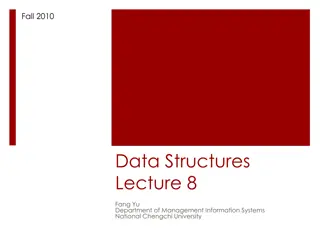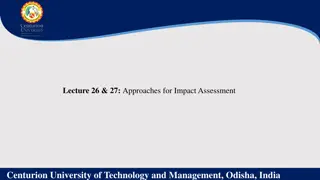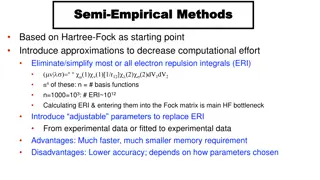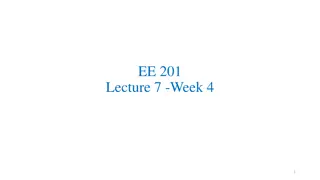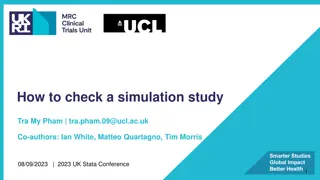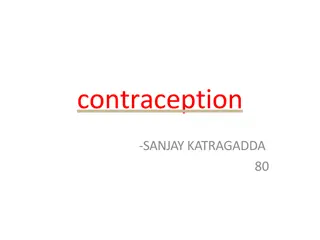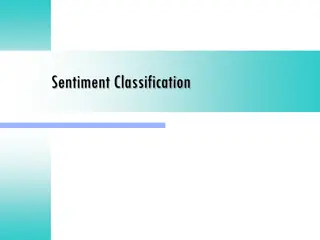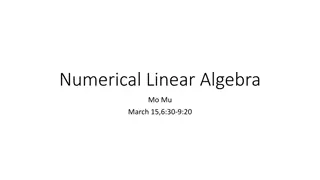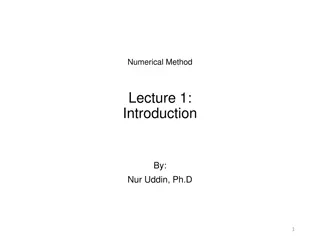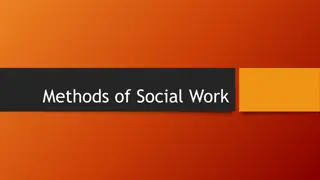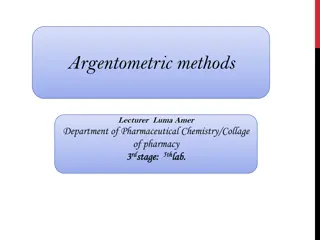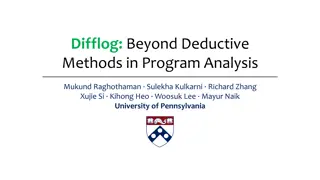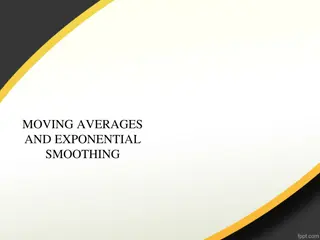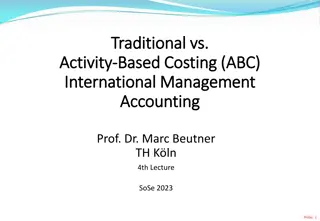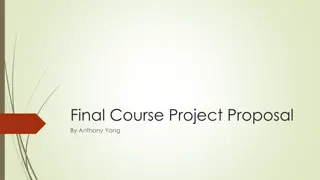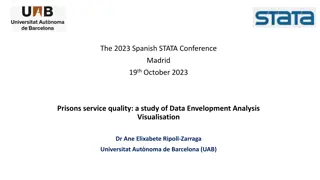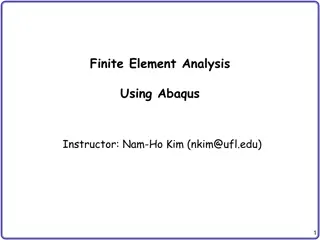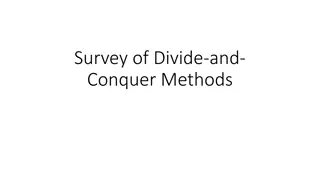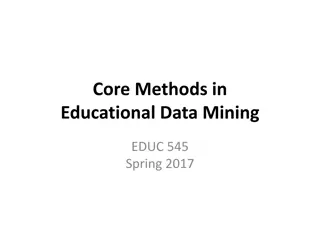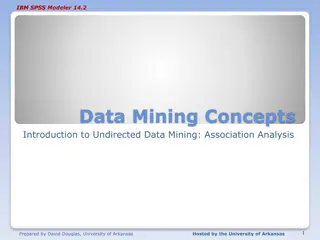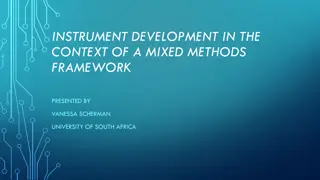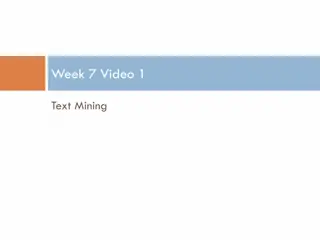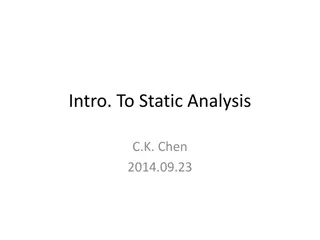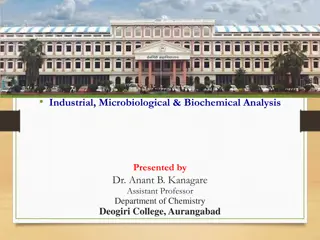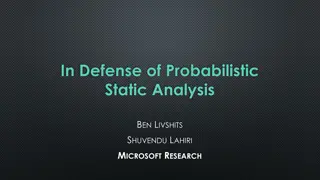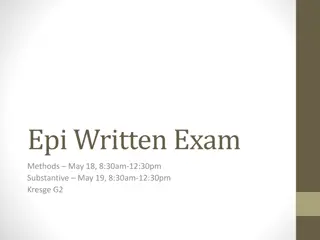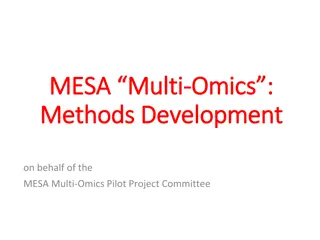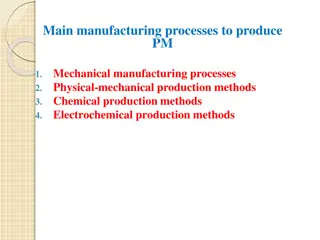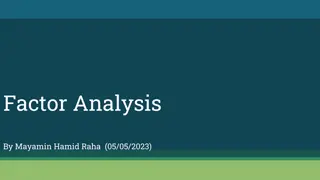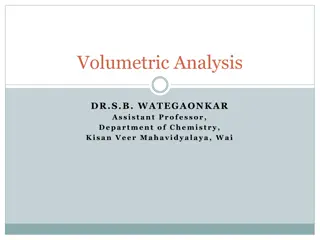Market Analysis (Project Formulation)
This detailed guide covers essential aspects of market analysis and project formulation in entrepreneurship, including feasibility analysis, techno-economic analysis, market demand analysis, steps in market analysis, and factors to consider for market demand analysis. Explore how to assess market de
2 views • 30 slides
Extension Teaching Methods
Extension teaching methods play a crucial role in facilitating communication and knowledge transfer between rural communities and extension workers. These methods aim to engage, stimulate, and guide learners through the process of acquiring new skills and knowledge. Centurion University in India emp
4 views • 8 slides
Algorithm Analysis: Key Concepts and Methods
Exploring algorithm analysis through topics like input-output analysis, running time evaluation, experimental studies, limitations, theoretical analysis, pseudocode explanation, and control flow details. Delve into how algorithms perform based on input sizes, types, and different analytical methods
3 views • 35 slides
Approaches for Impact Assessment at Centurion University, India
Various approaches for impact assessment include Experimental Design, Quasi-Experimental Design, Before-After Comparison, Counterfactual Analysis, Cost-Benefit Analysis, Qualitative Methods, and Mixed Methods. These methods help evaluate the effectiveness and efficiency of interventions by measuring
0 views • 4 slides
Comprehensive Cost Management Training Objectives
This detailed training agenda outlines a comprehensive program focusing on cost management, including an overview of cost management importance, cost object definition, cost assignment, analysis, and reporting. It covers topics such as understanding cost models, cost allocations, various types of an
4 views • 41 slides
Overview of Semi-Empirical Methods Based on Hartree-Fock
Semi-empirical methods derived from Hartree-Fock theory aim to reduce computational effort by approximating or eliminating electron repulsion integrals. Strategies include introducing adjustable parameters to replace ERI calculations and utilizing zero differential overlap methods like CNDO, INDO, N
1 views • 11 slides
Electrical Engineering Lecture on Methods of Analysis and Selected Topics
Explore lectures on methods of analysis such as source conversions, current sources in parallel, mesh analysis, supermesh, and examples in the field of electrical engineering. Get insights on loop currents, Kirchhoff's voltage law, and formatted approaches for mesh analysis. Engage with assignments
0 views • 15 slides
How to Check a Simulation Study: Methods and Considerations
Simulation studies are often used to evaluate statistical methods and study power, but they can sometimes produce misleading results. This work discusses strategies to assess and improve the quality of simulation studies, drawing on experiences and considerations outlined in relevant literature. A s
0 views • 31 slides
Contraception: Methods, Importance, and Considerations
Contraception refers to methods used to prevent unwanted pregnancies, regulate pregnancy timing, and spacing between pregnancies. It is essential for women's reproductive health and can include barrier methods, hormonal methods, emergency contraception, and intrauterine devices. These methods are sa
4 views • 28 slides
Sentiment Classification Methods
Sentiment classification can be done through supervised or unsupervised methods. Unsupervised methods utilize lexical resources and heuristics, while supervised methods rely on labeled examples for training. VADER is a popular tool for sentiment analysis using curated lexicons and rules. The classif
7 views • 17 slides
Comprehensive Overview of Numerical Linear Algebra Methods for Solving Linear Systems
Explore numerical linear algebra techniques for solving linear systems of equations, including direct and iterative methods. Delve into topics like Gaussian elimination, LU factorization, band solvers, sparse solvers, iterative techniques, and more. Gain insights into basic iterative methods, error
6 views • 12 slides
Introduction to Numerical Methods: A Comprehensive Overview
Numerical methods play a crucial role in solving mathematical problems efficiently through arithmetic operations. This lecture by Dr. Nur Uddin covers the fundamental concepts of numerical methods, emphasizing their importance in engineering problem-solving with the use of modern digital computers.
1 views • 17 slides
Methods of Social Work
Methods of social work encompass various approaches aimed at enhancing social functioning and addressing problems in individuals and communities. These methods are categorized into primary and secondary methods, each serving different purposes in the field. Primary methods involve direct interaction
0 views • 20 slides
Argentometric Methods in Pharmaceutical Chemistry
Argentometric methods, as taught by Lecturer Luma Amer from the Department of Pharmaceutical Chemistry at the College of Pharmacy, involve titrations using silver-based compounds like silver nitrate. These methods have limitations due to co-precipitation effects and limited indicator choices. Parame
0 views • 14 slides
Advancements in Program Analysis Beyond Deductive Methods
Explore the evolution of program analysis beyond deductive methods with innovative tools like static analyzers and data-driven analysis design. Discover the challenges faced, such as undecidable analysis questions and scalability issues, and the strategies employed to address them. Learn about the s
0 views • 24 slides
Moving Averages and Exponential Smoothing Methods
Forecasting methods like moving averages and exponential smoothing are essential for analyzing time series data. Averaging methods involve equally weighted observations, while exponential smoothing methods assign unequal weights that decay exponentially. Both methods can be useful for forecasting in
0 views • 18 slides
Activity-Based Costing (ABC) in International Management: Methods and Analysis
Explore the application of Activity-Based Costing (ABC) in International Management, focusing on methods of assigning overheads, cost drivers, product and period costs, and value chain analysis. Dive into topics such as budgetary control systems, standard costing, flexible budgets, variance analysis
1 views • 48 slides
Data Analysis and Passage Analysis Project Proposal
This project proposal by Anthony Yang focuses on developing a Java program for data analysis and passage analysis. The motivation behind the project is to gain more knowledge in computer science and statistics-related topics while utilizing technology to extract useful insights from data. The propos
3 views • 8 slides
Efficiency Methodological Approaches in Prisons Service Quality Study
Exploring efficiency methodologies in analyzing prisons service quality, this study focuses on parametric and non-parametric approaches such as Data Envelopment Analysis (DEA) and Stochastic Frontier Analysis (SFA). It delves into benchmarking techniques, productivity analysis, and the implications
0 views • 21 slides
Types of Birth Control Methods and Their Effectiveness
Explore the different types of birth control available, including abstinence, hormonal methods, barrier methods, and permanent methods. Learn about the effectiveness rates, how they work, and their pros and cons to make an informed decision about contraception. From hormonal options like pills, patc
1 views • 23 slides
Finite Element Analysis Using Abaqus: Basics and Methods
Learn about the basics and methods of Finite Element Analysis using Abaqus. Explore topics such as preprocessing, interactive mode, analysis input files, components modeling, FEM modeling, and more. Understand the advantages and disadvantages of using GUI versus Python scripting, and how to create F
0 views • 33 slides
Solving Systems of Equations: New Methods and Applications
The content discusses various methods for solving systems of equations, including substitution and elimination methods. It presents real-world problems involving money, sales figures, and fishing competitions to demonstrate the application of these methods. Readers will learn how to apply these tech
0 views • 10 slides
Procedural Decomposition and Static Methods in Programming
Understanding procedural decomposition and static methods is essential in programming to reduce redundancy, organize code effectively, and manage complexity. Procedural decomposition involves dividing a problem into methods, while static methods help in code reuse and managing complexity. By designi
0 views • 18 slides
Data Collection Methods for Business Analysis
Data collection is essential for analyzing business performance and making informed decisions. Various data collection methods like primary and secondary data collection help evaluate outcomes and draw conclusions. Primary data includes raw information obtained firsthand, while quantitative methods
0 views • 15 slides
Enhancing Phylogenetic Analysis Using Divide-and-Conquer Methods
Large-scale phylogenetics presents challenges due to NP-hardness and dataset sizes. Divide-and-conquer methods like SATe, PASTA, and MAGUS enable efficient processing of large datasets by dividing, aligning, and merging subsets with accuracy. MAGUS, a variant of PASTA, utilizes a unique alignment me
0 views • 15 slides
Methods in Educational Data Mining - Assignments and Analyses
Dive into the world of educational data mining through a series of assignments focusing on various analysis methods such as principal component analysis, factor analysis, Learning Factors Analysis, Barnes's Q-Matrix method, and more. Participants present their solutions, tools used, and final result
0 views • 37 slides
Introduction to IBM SPSS Modeler: Association Analysis and Market Basket Analysis
Understanding Association Analysis in IBM SPSS Modeler 14.2, also known as Affinity Analysis or Market Basket Analysis. Learn about identifying patterns in data without specific targets, exploring data mining in an unsupervised manner. Discover the uses of Association Rules, including insights into
1 views • 18 slides
Instrument Development in Mixed Methods Framework by Vanessa Scherman
Mixed methods research presented by Vanessa Scherman from the University of South Africa explores the development of instruments within a mixed methods framework. The content covers an overview of mixed methods, methodological norms, instrumental development, and closing the loop. It discusses the i
0 views • 40 slides
Text Mining Methods and Applications
Text mining is a complex field that presents a significant disjunction in methods compared to other data analysis approaches. Pre-LLM methods are still relevant in various applications, showcasing different performance in text mining tasks. The analysis involves examining individual words' presence,
0 views • 13 slides
Introduction to Static Analysis in C.K. Chen's Presentation
Explore the fundamentals of static analysis in C.K. Chen's presentation, covering topics such as common tools in Linux, disassembly, reverse assembly, and tips for static analysis. Discover how static analysis can be used to analyze malware without execution and learn about the information that can
1 views • 54 slides
Industrial, Microbiological & Biochemical Analysis - Course Overview by Dr. Anant B. Kanagare
Dr. Anant B. Kanagare, an Assistant Professor at Deogiri College, Aurangabad, presents a comprehensive course on Industrial, Microbiological, and Biochemical Analysis (Course Code ACH502). The course covers topics such as Industrial Analysis, Microbiological Analysis, and Biochemical Analysis. Dr. K
1 views • 16 slides
Benefits of Probabilistic Static Analysis for Improving Program Analysis
Probabilistic static analysis offers a novel approach to enhancing the accuracy and usefulness of program analysis results. By introducing probabilistic treatment in static analysis, uncertainties and imprecisions can be addressed, leading to more interpretable and actionable outcomes. This methodol
0 views • 11 slides
Evolution of Survival Sample Size Methods and Considerations in Survival Analysis
Survival analysis sample size determination is crucial for estimating the expected duration of time to an event accurately. Over time, methods have evolved from simple approximations to more complex models, offering greater flexibility and accuracy in study design. Considerations such as expected su
0 views • 9 slides
Doctoral Methods and Substantive Exams Overview
Doctoral students will take two exams, Methods on May 18 and Substantive on May 19. Methods exam has 3 questions focusing on Causal Inference, Study Design, Data Analysis, graded out of 6. Substantive exam covers 12 areas of interest with 2 questions each, except for Epi Methods. Passing grade is 7
0 views • 8 slides
Advancing Multi-Omics Research with Integrated Methods
Exploring the importance of multi-variate methods in multi-omics research to integrate diverse datasets such as phenotypes, metabolites, expression, methylation, and SNPs. The overview covers matrix-based methods, sparse methods for feature selection, and an example analysis from the MESA Multi-Omic
0 views • 17 slides
Main Manufacturing Processes to Produce PM - Mechanical, Chemical, Electrochemical
The process of producing PM involves various manufacturing processes such as mechanical grinding and milling, physical-mechanical production methods, chemical production methods, and electrochemical production methods. Mechanical processes include grinding and milling using jaw crushers, hammer grin
0 views • 12 slides
Particle Size Analysis in Industrial Pharmacy: Methods and Importance
Particle size analysis is crucial in pharmacy for determining the size range and properties of particles. This lecture covers different methods of particle size analysis, such as microscopy, sieve analysis, sedimentation, and electronic determination, along with the importance of particle size in ph
0 views • 47 slides
Factor Analysis
Factor analysis is a statistical method used to identify underlying factors that explain correlations among variables. It helps in reducing large datasets by finding uncorrelated variables. There are two types of factor analysis: Exploratory Factor Analysis (EFA) and Confirmatory Factor Analysis (CF
0 views • 18 slides
Classes and Special Methods in Python
Classes in Python allow for creating objects with specialized methods like dunder methods. By employing these special methods, various mechanisms can be implemented seamlessly. For instance, the example of playing cards demonstrates how to define a class with methods such as __init__ and __str__. Ad
0 views • 41 slides
Volumetric Analysis
The study of chemical composition involves identification and estimation of substances. Qualitative analysis identifies substances, while quantitative analysis estimates their constituents using various methods like Volumetry, Gravimetry, and Modern techniques. Non-instrumental methods have advantag
0 views • 22 slides


